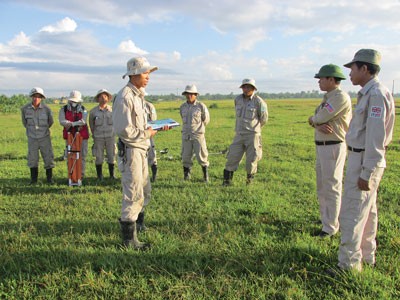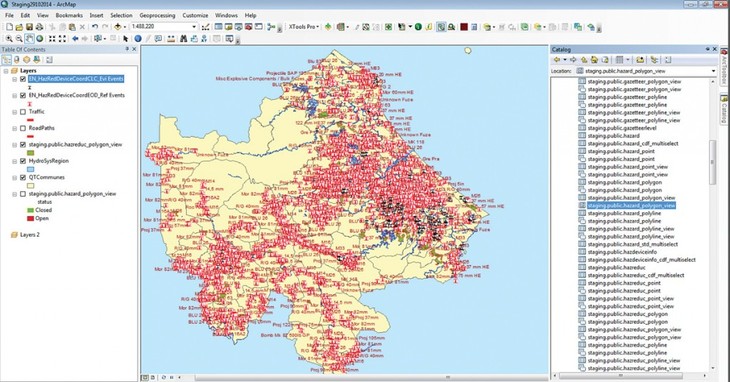(VOVworld) – The Legacies of War Coordination Center established in January in Quang Tri province has developed a coordinated response mechanism for removing unexploded ordinance that still remain 40 years after the war. The program is being jointly implemented by the Quang Tri government and Norwegian People’s Aid.
Although the central government and Quang Tri provincial authorities began to address the problem of unexploded bombs and mines left by the war immediately after Vietnam was liberated in 1975, the area of contaminated land in the province remains considerable.
 |
MAG and NPA teams in the field discuss the handover of a cluster munitions CHA. (Photo: landmines.org.vn)
|
Twenty years ago, the government began allowing Quang Tri to receive foreign funding assistance. Foreign non-governmental organizations were licensed to participate in unexploded ordnance clearance. But the effort has proven less effective than anticipated due to a lack of a coordination.
RENEW, a Norwegian project that has been underway in Quang Tri for 15 years, has been one of the most effective international efforts. According to Ngo Xuan Hien, RENEW’s Communications and Development Manager, clearance has been carried out in response to each district’s socio-economic development needs. This approach takes a long time to achieve any results because finding the unexploded ordinance is haphazard.
Lack of coordination between information sources and clearance teams has limited the effectiveness of mine clearance operations before now, making the establishment of a coordination center vital.
Hien said that “since the center was launched, all non-governmental organizations have closely coordinated with each other. Each mine action organization in Quang Tri uses the operational methodology to which they are best suited. For example, RENEW is in charge of conducting surveys, while the Mines Advisory Group (MAG), which is strong in on-site clearance, can use confirmed information provided by RENEW to guide its missions.”
In addition to RENEW, there are at least 10 other non-governmental organizations involved in unexploded ordnance disposal in Quang Tri, including Norwegian People’s Aid, the UK’s Mines Advisory Group (MAG), the US’s Clear Path International (CPI), Peace Trees Vietnam, and Germany’s Solidarity Service International (SODI).
As of last July, international organizations had helped Quang Tri clear nearly 9,500 hectares of land for development projects, safely removing and destroying more than 395,000 cluster bombs and other ordnance.
Nguyen Duc Quang, Deputy Director of the provincial Department of Foreign Affairs, said “the center’s main tasks are to coordinate all activities related to resolving the aftermath of the war in Quang Tri province and prevent duplication of effort. All NGOs delegate the management of their planning and operations to their local partners, and help the province create and maintain a shared information database.”
In the past, each organization set up a separate hotline. Now a single hotline number, managed by the Legacies of War Coordination Center, is used throughout the province.
Nguyen Thanh Phu, who works at the Center, told VOV that “the creation of a single mechanism for reporting and sharing information about all activities related to unexploded ordnance disposal has made tracing information very easy. What we needed was a way to coordinate and combine location and removal efforts.”
 |
| ERW found in Quang Tri by EOD clearance activities via a live connection from provincial IMSMA to ArcGIS. (Photo: landmines.org.vn) |
Since the aftermath of war remains a huge problem, Quang Tri authorities have taken responsibility for determining which zones are hazardous and which are safe and designing a master plan for bomb and mine clearance.
Though the Center is still new, it is already proving its effectiveness. Since the beginning of this year, Quang Tri has reported no injuries caused by exploding war remnants. Any report of unexploded munitions is promptly relayed to the specific operator assigned to that zone and the UXO is safely disposed of. In the future, all confirmed hazardous areas (CHA) in Quang Tri will be prioritized for explosive remnant clearance.